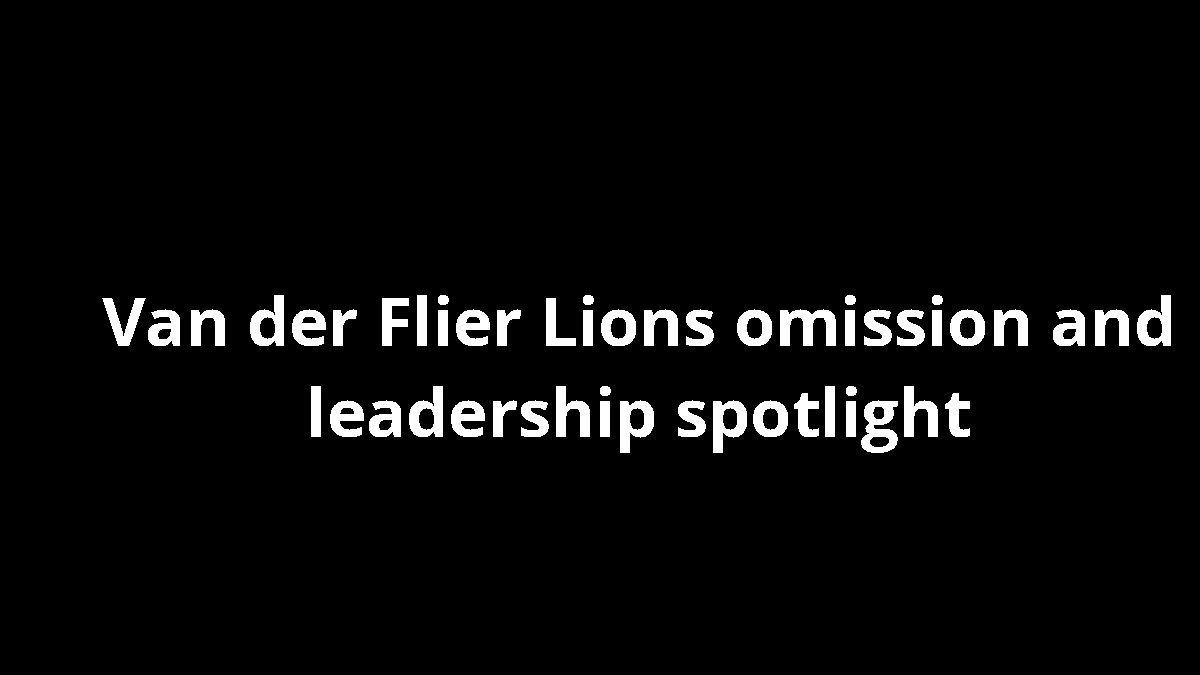Van der Flier on Lions omission: hard to take
Josh van der Flier’s reaction to the Lions omission has become a central talking point for Irish rugby fans and coaches alike. In his own words, the Leinster back-row forward described the decision as something Van der Flier Lions omission that stings when a player pushes his case for selection. The phrase is not intended as a slogan but as a reminder of how closely such choices are watched by players who carry leadership responsibilities. He has explained that the feeling was raw, yet the absence has not dampened his intent to contribute for Ireland when called upon. Across the sport, leaders like him channel disappointment into daily improvement, study, and a sharpened competitive edge. For readers following the broader calendar, the omission is a signal that selection races remain fiercely contested and deeply scrutinised by coaches and pundits alike. BBC Sport Rugby has tracked the debate, while World Rugby’s analysis provides wider context on how back rows adapt under pressure.
The immediate takeaway for Leinster and Ireland is not resignation but recalibration. Van der Flier’s recent form in the Pro14 and Champions Cup highlighted a player who thrives on responsibility. His leadership style—calm yet direct, relentless at the breakdown, and vocal when needed—suggests a readiness to be part of Ireland’s future plans even if Lions selection pauses for now. The broader rugby community has watched closely, comparing his trajectory with peers who have earned Test caps, and gauging where incremental leadership gains translate to international opportunities. As the season progresses, the narrative may shift from a moment of exclusion to one of renewed contribution and strategic growth.
Reaction to the omission
The initial reaction among coaches and teammates reflected a professional approach to a tough decision. Van der Flier Lions omission moments were described as painful but instructive, a catalyst for refining priorities and sharpening leadership subtlety at the breakdown and in defensive structures.
Impact on Ireland and Leinster plans
Analysts note that while the Lions omission is a talking point, it does not erase Van der Flier’s value to Ireland or Leinster. His willingness to captain Leinster in a high-stakes fixture earlier this season underlines his leadership width and readiness to fill a future captaincy role if required. The discussion also underscores how Ireland might balance a multi‑format calendar with a roster capable of stepping into leadership roles when called upon.
Leinster captain to Sharks: Van der Flier leads from the front
Leinster handed Van der Flier the armband against the Sharks, and the moment placed him at the heart of on-field decision-making. The fixture offered a platform to demonstrate how a captain can influence a game’s tempo, align teammates through phases, and maintain composure during high-intensity passages. His leadership approach combines technical excellence with a steady voice that peers trust in crucial moments. The Sharks test offered a practical laboratory for assessing how a back-row captain guides a pack through set-piece battles, lineouts, and breakdown contests—elements closely watched by national selectors for Ireland and the broader Lions plans. For a player already identified as a natural leader, directing Leinster against a renowned southern hemisphere side accentuated potential pathways to international roles. World Rugby also emphasises the value of leadership in cross-continental fixtures as a developmental lever.
The match exposed how Van der Flier translates leadership into tangible field actions. His calls at the ruck, his management of tempo in attack phases, and his ability to rally teammates after errors all reflected a captaincy growing under pressure. Critics and supporters alike highlighted his consistency in communication and his capacity to maintain equilibrium when the pace quickened. While the Lions omission remains a common talking point among fans, the on-field leadership displayed against the Sharks is a reminder that leadership development often travels a longer road than any single selection event. The experiences accrued in such games contribute to a player’s readiness for broader duties, including potential future Lions consideration.
Directing the pack
Van der Flier’s on-field instructions helped Leinster sustain momentum during critical stages. His leadership time and again redirected defensive shapes and ensured the side remained cohesive under pressure.
Voice in the breakdown
In the breakdown, his voice acted as a stabiliser, coordinating cleanup and contest routes while teammates absorbed the rhythm of the match. This is the kind of leadership that national teams often reward with future responsibilities.
From Wesley College to Leinster: captaincy across sports
The journey from schoolboy captain to one of Leinster’s trusted leaders is a narrative that resonates with many rugby fans. Van der Flier’s evolution from Wesley College’s captaincy, where his early leadership showed in cricket and rugby alike, demonstrates a cross-sport maturity that has informed his approach to captaincy at the professional level. The ability to lead across sports—especially cricket and rugby—signals a broader understanding of team dynamics, communication, and the responsibilities that come with wearing the armband. In the modern game, where calendars compress and leadership depth matters, such cross-disciplinary experiences are increasingly valued by coaches seeking players who can adapt leadership styles to different challenges. BBC Sport Rugby has highlighted stories of players who moved into leadership roles after multi-sport experiences, illustrating how early captaincy can shape future international prospects.
The Wesley College chapter is more than a nostalgic anchor; it reflects an underlying philosophy. From youth competitions to professional stages, Van der Flier’s captaincy carries forward a discipline that thrives under pressure. The ability to switch between sports while maintaining leadership standards underscores a holistic view of athletic development. For Ireland and Leinster, these roots inform a leadership profile that can adapt to demanding schedules, new teammates, and evolving strategic goals as the rugby calendar expands internationally. The cross-sport experience becomes a talking point for selectors assessing leadership versatility as they map future roles within the national team setup.
Cross-sport leadership instinct
The instinct to lead across sports translates into calm, purposeful communication during phases and in critical moments of a match. This versatility is increasingly seen as a valuable asset for squads navigating a crowded calendar.
Cricket captaincy background
Having captained cricket teams in school, Van der Flier developed strategic planning and on-the-spot decision-making that translates to rugby leadership. The discipline from cricket’s field placements informs his approach to rugby’s continuous play and wider game management.
Leadership under pressure: Van der Flier’s with Leinster
Leadership under pressure is a defining trait of Van der Flier’s career path. When a cap or a role in the national team feels within reach yet remains distant, the ability to maintain composure becomes a differentiator. In Leinster’s high-paced environment, leadership under pressure is tested through backline resets, lineout calls, and the rhythm of a long season. Observers note that his leadership style—calm under fire, relentless at the ruck, and vocal when necessary—offers a model for younger players who view him as a blueprint for managing stress and maintaining performance. For Ireland’s broader ambitions, the capacity to keep a team focused amid selection debates and fixture congestion is as important as individual skill. The ongoing conversation around Lions plans continues to emphasise the role of leaders who can navigate complex sequences with poise.
From a tactical lens, Van der Flier’s leadership helps Leinster sustain pressure and convert field position into scoring opportunities. His communication aligns forwards around rucks, mauls, and set-pieces, while his decision-making in breakdowns keeps opponents honest. This combination of cognitive clarity and physical intensity creates a leadership profile that is increasingly valued at both club and country levels. The dialogue around his captaincy also reflects how modern teams balance multiple leaders, ensuring there is depth when selectors weigh Ireland and Lions projections. For readers, the takeaway is clear: leadership under pressure is a long-term asset that compounds over seasons and can influence selections in ways that go beyond a single match.
Calm at the breakdown
His calm attitude at the breakdown steadies the team during chaotic moments, turning pressure into constructive play.
Decision-making in tight moments
Quick, clear calls in tight moments help Leinster retain momentum and control the game’s tempo.
What van der Flier’s captaincy means for Ireland and Lions plans
The implications of Van der Flier’s captaincy for Ireland and potential Lions plans extend beyond a single season. His leadership presence adds to the depth of Ireland’s squad, offering a player who can bridge club and country with a consistent voice and a demonstrable track record of performing under pressure. For Ireland, his path includes mentoring teammates, shaping culture, and providing a steady influence in training camps and tour environments. The Lions consider leadership capacity as a factor when selecting players who can shoulder additional responsibilities on tour and in Test matches. Van der Flier’s ongoing development as a captain may tilt selectors toward a broader leadership remit for him in future cycles.
In terms of strategical planning, teams will weigh how a captain like Van der Flier can contribute to Ireland’s evolving game plan, including defensive organization, breakdown accuracy, and multi-phase attack sequences. The Lions, meanwhile, assess whether his leadership traits suit the rigours of a high-pressure tour environment and the demands of cross-hemisphere fixtures. The ongoing dialogue around his career trajectory reflects a sport where leadership complements technical skill, tactical know-how, and the capacity to adapt to new teammates and coaching styles. For rugby fans, the question remains open: could the leadership qualities he demonstrates for Leinster eventually translate into an Ireland armband and, more broadly, Lions opportunities? The answer will emerge as seasons unfold and selectors weigh leadership alongside on-field outputs.
Pathway to international captaincy
If the trajectory continues, a future Ireland captaincy could be a natural next step for him, with Lions opportunities a longer-term consideration.
Lions speculation and timing
Timing is everything in selection cycles, and Van der Flier’s leadership growth could intersect with a future Lions window when the squad rebuilds and new cap opportunities arise.


